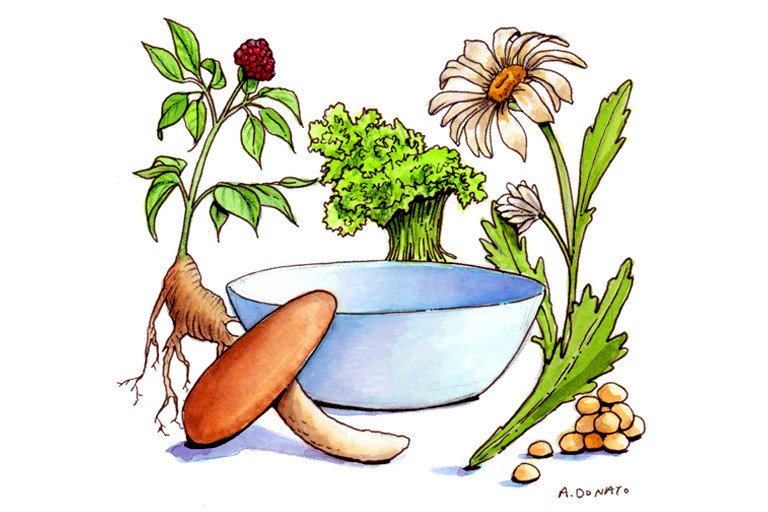
Common Names
- Sun Soup
- Selected vegetables
- SV
For Patients & Caregivers
Tell your healthcare providers about any dietary supplements you’re taking, such as herbs, vitamins, minerals, and natural or home remedies. This will help them manage your care and keep you safe.
Sun Farms Vegetable Soup has not been shown effective in treating or preventing cancer.
Sun Farms Vegetable Soup contains soybean, shiitake mushroom, mung bean, red date, scallion, garlic, lentil bean, leek, hawthorn fruit, onion, American ginseng, angelica root, licorice, dandelion root, senegal root, ginger, olive, sesame seed, and parsley.
In mice that were fed dried Sun Soup powder, tumor growth was slowed by 53–74%. Lab tests showed that Sun Soup contains inositol hexaphosphate (IP6), a compound that may slow the growth of cancer cells. It also contains genistein, daidzein, and coumestrol, which are phytoestrogens found in soybeans.
Studies in humans are limited. Sun Soup was associated with survival improvements in small studies of patients with advanced non-small cell lung cancer. Larger studies are needed.
- To prevent and treat cancer
A small showed that Sun Soup may improve survival in late-stage, non-small cell lung cancer patients, but its use for the treatment or prevention of other cancers has not been studied. - To treat HIV and AIDS
Evidence is lacking to support this claim. - To stimulate the immune system
Although laboratory studies have shown that the ingredients found in Sun Soup stimulate certain aspects of the immune system, it is not known if such effects occur in the human body. - To maintain weight in patients with cancer or AIDS
A small study in late-stage non-small cell lung cancer patients supports this claim.
- Sun Soup can cause gastrointestinal fullness or bloating.
For Healthcare Professionals
A proprietary product developed by the biochemist Alexander Sun, Sun Soup contains water, soybean, shiitake mushroom, mung bean, red date, scallion, garlic, lentil bean, leek, hawthorn fruit, onion, American ginseng, angelica root, licorice, dandelion root, senegal root, ginger, olive, sesame seed, and parsley (1). Patients use it in conjunction with conventional therapies to prevent and treat cancer, AIDS, promote weight gain, and as an immunostimulant.
Animal studies of Sun Soup suggest antitumor effects. Studies in humans are quite limited and preliminary, however. When administered concurrently with conventional therapies, the product was associated with improved survival, weight maintenance, and improved Karnofsky Performance Scale Score in patients with advanced non-small cell lung cancer (1) (2). Larger randomized studies are needed to confirm these findings.
- Cancer
- HIV, AIDS
- Immunostimulation
- Maintain weight
The inventor suggests that antitumor activities of compounds in some constituents act synergistically (1). Quantitative analysis of freeze-dried powder (DSV) revealed approximately 63 mg inositol hexaphosphate (IP6), 2.6 mg genistein, 4.4 mg daidzein, and 15.5 mg coumestrol per serving (2). Preclinical studies performed with IP6 suggest that it slows initiation or promotion, inhibits proliferation by chelation of metalloproteins, causes G0/G1 arrest, and induces differentiation of various cancer cell lines. In vitro, genistein inhibits angiogenesis, induces DNA damage in cancer cell lines, and along with daidzein and coumestrol, inhibits the growth of human prostate cancer cells (3). Genistein and coumestrol also induced NADPH:quinone reductase, a detoxifying phase II enzyme in colonic cells, leading to possible antitumor effects (4).
Shiitake mushrooms contain the polysaccharide lentinan, which may act as an immunomodulator and enhance production of IL-1, TNF, LAK, cytotoxic T lymphocytes, and cytotoxic peritoneal exudate cells. Mice fed shiitake extract, mung bean extract, or both exhibited tumor inhibition of 60%, 53%, and 82% respectively, when compared to the control group after 22 days.
Common: Gastrointestinal fullness or bloating after ingestion (1).
Although no drug interactions have been reported, several ingredients of Sun Soup can interact with prescription drugs. Please see the following monographs:
Lentinan
Hawthorn fruit
Ginger
Licorice
Soy
American ginseng